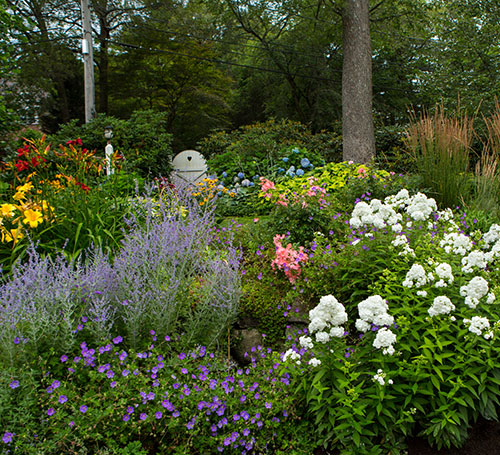
Your garden is an orchestra! Healthy gardens play to the eyes like a fine-tuned orchestra plays to a conductor’s ears. Not unlike a musical composition, the intricately woven notes of a successful garden involve a high level of behind-the-scene detail - much more than simply water and sun.
So, are you ready to become a conductor of plants?
Consider the Complexities:
It is important to recognize that the timing and technique for pruning ornamental trees and shrubs may vary significantly from one plant to another. The cookie-cutter approach used by many landscapers may not be conducive to your garden’s success. Any old landscaper may be great for routine maintenance, but they may not have the knowledge to apply the correct gardening principals to your more complex gardening needs.
Common pruning mistake! The uniform shearing of shrubs may be more pleasing to the eye for some but, as it turns out, this type of unnatural trimming creates a higher density of outer growth, causing the plant to weaken internally, thus shortening its life-span. In the end, it won’t look quite so pleasing! We often underestimate the long-term effects of “minor” garden alterations - think- how differently might your favorite song sound with the change of just one beat?
For more on proper pruning -
https://www.finegardeners.com/ornamental-pruning-of-trees-and-shrubs.htm
Perennial Garden Maintenance:
Perennial gardens are fun, but now that you have one, how do you make it last? The high level of detail required in maintaining a successful garden can become overwhelming once you start to consider the following factors:Weeds - they aren’t all bad. After all, the man who invented Velcro was inspired by the Burdock weed (burrs)! While we may appreciate his invention, this doesn’t mean we want weeds growing amongst our gardens and suffocating our plants. Invasive plants can ruin a garden. The art of distinguishing desirable seedlings from weeds has been known to stump even the most seasoned gardeners; and trust me, the “wait and see” approach is not unlike unleashing a bunch of rambunctious 5 year olds into the symphony orchestra on opening night!
But how about desirable plants which outgrow their space? Dividing a plant may sound simple, but the integrity of the root and crown must be maintained in order to carry out a successful transplantation. The point? Do your research by consulting a professional before you dig.
Volcano Mounding - gardeners may be unaware as to the reason landscapers often do this. Why? Because there is no good reason! “Monkey see, monkey do” is not a wise gardening approach. Rather than planting your tree on a mound for aesthetics, think concave. Allowing the roots as well as the flare of the trunk to more easily receive necessary exposure to the elements will improve the health, and therefore the long-term aesthetics, of your trees and shrubs.
Plant Editing - plant health, thus longevity and quality of blooms, may deteriorate significantly when plants of a similar size are placed too closely together. Eager gardeners often incorporate many young plants into a small space because the area may otherwise appear too empty, but once these plants fill out they must ultimately compete with one another for survival, and placing such stress on your desirable plants will lead only to their demise. Do you want the tree you put there growing hidden monster seedlings in the beautiful shrub next to it? If you don’t have time to maintain it - ask yourself how it will look in 5 or 10 years. Many landscapers may be great at installing plants, but what’s the longer term plan of care? Unless you’re willing to micromanage your garden, it can turn into jungle when installed without prior knowledge of plant growth specifics.
To properly address these matters, it may be wise to consult with a professional before your lovely garden grows out of control and, essentially, commits PLANTICIDE!
https://www.finegardeners.com/garden-and-lawn-maintenance.htm
Last, but not least, what kind of dessert do all good gardeners have? Brown-knees! All kidding aside, this joke contains a simple truth - real gardeners and landscapers should be willing to use the real tools - their hands and knees. Fine-tuning the sounds of any orchestra requires a willingness to “plant” oneself smack in the middle of all the dirt.
To consult with a Massachusetts Certified Arborist, Horticulturist and Master Gardener, contact Fine Gardeners today!
Post written by Cilla Denham